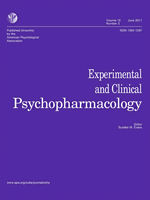
EXPERIMENTAL AND CLINICAL PSYCHOPHARMACOLOGY
Scope & Guideline
Pioneering Research for Clinical Excellence
Introduction
Aims and Scopes
- Psychopharmacology of Substances:
Explores the effects of various psychoactive substances (e.g., cannabis, alcohol, opioids) on psychological and physiological functions, emphasizing their implications for mental health and addiction. - Behavioral Economics and Substance Use:
Utilizes behavioral economic frameworks to assess factors influencing substance use behaviors, including demand, decision-making processes, and the impact of socio-economic variables. - Coping Mechanisms and Substance Interactions:
Investigates how individuals cope with substance use and the interplay between different substances, including the psychological and physiological effects of co-use. - Clinical Interventions and Treatment Outcomes:
Focuses on developing and evaluating interventions for substance use disorders, including medication-assisted treatments, behavioral therapies, and harm reduction strategies. - Psychometric Evaluation of Assessment Tools:
Involves the creation and validation of scales and questionnaires aimed at measuring substance use motives, cravings, and related psychological constructs. - Impact of Sociocultural Factors:
Examines how cultural, racial, and socio-economic factors influence substance use behaviors and treatment outcomes, contributing to a more nuanced understanding of addiction.
Trending and Emerging
- Cannabis Research and Its Effects:
Recent publications show a significant increase in research related to cannabis, particularly its cognitive effects, therapeutic uses, and interactions with other substances, reflecting the changing legal landscape and societal interest. - Impact of COVID-19 on Substance Use:
Emerging studies are investigating how the COVID-19 pandemic has influenced patterns of substance use, highlighting the need for timely research addressing public health concerns. - Diversity and Inclusion in Substance Use Research:
There is a growing emphasis on including diverse populations in studies of substance use, particularly regarding how sociocultural factors affect treatment and outcomes. - Technological Interventions for Substance Use Disorders:
Research into digital interventions, including mobile applications and online support systems, is gaining momentum as effective tools for managing substance use and promoting recovery. - Psychological Mechanisms Underlying Substance Use:
An increasing number of studies are focusing on the psychological constructs related to substance use, such as impulsivity, anxiety sensitivity, and emotional regulation, seeking to understand their roles in addiction.
Declining or Waning
- Traditional Pharmacological Treatments:
Research focusing on conventional pharmacological treatments for substance use disorders is becoming less prevalent, as newer, integrative approaches that incorporate behavioral and psychological strategies gain traction. - Single-Substance Studies:
The emphasis on studies examining the effects of single substances (e.g., alcohol or nicotine in isolation) is declining in favor of more complex investigations into multi-substance interactions and their combined effects. - Longitudinal Studies on Substance Use Effects:
Longitudinal studies investigating the long-term effects of substance use are less frequently published, suggesting a shift towards more immediate and experimental research designs. - Generalized Addiction Models:
There is a noticeable decrease in research employing broad, generalized models of addiction, with a growing focus on specific populations and contextual factors influencing substance use.
Similar Journals

Neuropsychopharmacology Reports
Connecting research to practice in clinical psychology and psychiatry.Neuropsychopharmacology Reports is a leading open-access journal published by WILEY, dedicated to advancing the fields of clinical psychology, pharmacology, psychiatry, and mental health. Established in 2018, the journal aims to disseminate high-quality research findings, critical reviews, and innovative methodologies that elucidate the complexities of neuropsychopharmacology in enhancing mental health outcomes. With an impressive impact indicated by its Q2 rankings in several categories including Clinical Psychology and Pharmacology (medical) as of 2023, Neuropsychopharmacology Reports stands out as a vital resource for researchers, professionals, and students keen on exploring the interplay between pharmacological interventions and psychological well-being. The journal’s open-access nature ensures that critical advancements in this rapidly evolving field are readily available to a global audience, fostering collaboration and discourse among scholars and practitioners alike. Building on its indexed status with Scopus, the journal is positioned as a noteworthy contributor to ongoing discussions and developments in psychiatry and medical pharmacology.

Activitas Nervosa Superior Rediviva
Exploring the Frontiers of Neuropsychology and Mental HealthActivitas Nervosa Superior Rediviva is a peer-reviewed journal dedicated to the fields of neuropsychology, physiological psychology, psychiatry, and mental health research. Published by the esteemed SLOVAK ACADEMY OF SCIENCES, INSTITUTE OF NORMAL AND PATHOLOGICAL PHYSIOLOGY, this journal embraces an open-access model, facilitating the dissemination of critical findings and discussions within these evolving fields. With a focus on innovative studies spanning from 2009 to 2024, it provides a vital platform for researchers and professionals seeking to understand the complexities of the nervous system and related disorders. Although currently classified in the fourth quartile across relevant categories including neuropsychology and psychiatric health, the journal’s commitment to publishing quality research contributes significantly to the ongoing discourse among academics and clinicians alike. Activitas Nervosa Superior Rediviva invites scholars to engage with its content and further strengthen the integration of research and practice in mental health and neurological sciences.
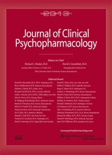
JOURNAL OF CLINICAL PSYCHOPHARMACOLOGY
Advancing Mental Health Through Innovative Pharmacological ResearchJOURNAL OF CLINICAL PSYCHOPHARMACOLOGY, an esteemed publication from Lippincott Williams & Wilkins, serves as a vital resource in the fields of pharmacology and psychiatry. With a notable Q2 ranking in both the medical pharmacology and psychiatry categories, this journal facilitates the dissemination of significant findings related to psychopharmacological research, clinical practices, and advancements in mental health treatment. The journal has been committed to publishing high-quality, peer-reviewed articles since its inception in 1981, covering a wide scope of topics crucial for professionals, researchers, and students alike. With a current impact factor and burgeoning interest from the academic community, the JOURNAL OF CLINICAL PSYCHOPHARMACOLOGY is essential for anyone engaged in the study or practice of clinical psychopharmacology, providing insights that shape contemporary psychiatric medication strategies and improve patient outcomes. For access, please refer to the official publication channels.

Adicciones
Unraveling the intricacies of addiction through rigorous research.Adicciones is a prominent academic journal dedicated to the fields of Medicine and Psychiatry, focusing on the multi-faceted issues surrounding addiction and substance use. Published by SOCIDROGALCOHOL in Spain, this journal has been a critical resource for researchers, clinicians, and students since its inception in 1994, with a commitment to advancing knowledge in addiction science for the benefit of public health. With an impressive impact factor that places it in the Q3 category of both Medicine (Miscellaneous) and Psychiatry and Mental Health according to 2023 rankings, Adicciones is recognized for its high-quality peer-reviewed articles that contribute to the ongoing dialogue in these vital fields. Although not currently an open-access journal, it provides valuable subscription-based access to its extensive repository of research findings and reviews, fostering a deeper understanding of the complex dynamics of addiction. The journal's continued relevance is underscored by its convergence into 2024, promising ongoing contributions that inspire new ideas and practices to combat addiction.
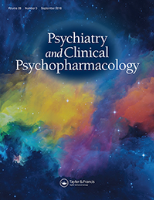
Psychiatry and Clinical Psychopharmacology
Advancing Mental Health Through Innovative ResearchPsychiatry and Clinical Psychopharmacology, an open-access journal published by AVES since 2017, is dedicated to advancing the fields of psychiatric medicine and psychopharmacology. With an ISSN of 2475-0573 and an E-ISSN of 2475-0581, this journal aims to provide a platform for disseminating innovative research and clinical findings relevant to mental health professionals and researchers. Although it currently holds a Q3 ranking in Pharmacology (medical) and a Q4 ranking in Psychiatry and Mental Health according to the 2023 category quartiles, the journal has established itself as a significant contributor to evolving discussions in these critical fields. Based in the United Kingdom, the journal encompasses diverse topics, ranging from pharmacological treatments to novel therapeutic approaches in psychiatry, thereby appealing to a broad audience of clinicians, scientists, and students. The open-access model ensures that all research is readily available, fostering an environment of collaboration and knowledge-sharing as the journal converges until 2024 to encompass the latest advancements in both pharmacology and clinical psychopharmacology.

Substance Abuse and Rehabilitation
Championing open access to vital addiction research.Substance Abuse and Rehabilitation, published by DOVE MEDICAL PRESS LTD, is a leading open-access journal dedicated to the study and treatment of substance abuse and related rehabilitation practices. With its ISSN 1179-8467, this journal provides a vital platform for researchers, clinicians, and students to disseminate their findings and insights in a field increasingly relevant to public health. Since becoming open access in 2010, the journal has enhanced its reach, allowing for a broader audience to engage with cutting-edge research and reviews that address the complexities of substance abuse disorders. The journal aims to foster innovation and interdisciplinary collaboration by publishing high-quality peer-reviewed articles that cover a wide range of topics, including addiction therapy, policy implications, and the social determinants of substance use. As a vital resource within the realm of addiction research, Substance Abuse and Rehabilitation plays a crucial role in driving forward knowledge and practices that can improve outcomes for individuals and communities affected by substance use issues.
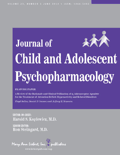
JOURNAL OF CHILD AND ADOLESCENT PSYCHOPHARMACOLOGY
Driving innovation in psychopharmacology for healthier futures.JOURNAL OF CHILD AND ADOLESCENT PSYCHOPHARMACOLOGY, published by MARY ANN LIEBERT, INC, stands as a premier academic journal dedicated to advancing the field of pediatric psychopharmacology. With a rich history of publication spanning from 1990 to 2024, this journal presents cutting-edge research that informs clinical practices and policy decisions impacting the mental health of children and adolescents. Ranked in the Q2 category for both Pediatrics, Perinatology and Child Health and Pharmacology (medical) as of 2023, it reflects its critical contribution to these fields, along with a respectable Q3 status in Psychiatry and Mental Health. Researchers and practitioners benefit from the journal's rigorous peer-reviewed articles, which delve into the efficacy, safety, and ethical implications of pharmacological treatments tailored for young populations. Although the journal does not currently offer Open Access, it remains a vital resource for anyone engaged in child and adolescent health research and treatment strategies. Its commitment to fostering dialogue and innovation in psychopharmacology ensures its pivotal role in shaping future standards and practices in this essential area of medical science.
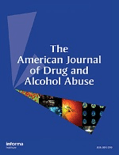
AMERICAN JOURNAL OF DRUG AND ALCOHOL ABUSE
Empowering Scholars with Insights into Addiction DynamicsAmerican Journal of Drug and Alcohol Abuse is a highly regarded publication in the field of substance abuse research, published by Taylor & Francis Inc. With its inception in 1974, this journal has become an essential resource for scholars and practitioners interested in clinical psychology, psychiatry, and the multifaceted issues surrounding drug and alcohol use. It holds a notable Q2 ranking in Clinical Psychology, Medicine (miscellaneous), and Psychiatry and Mental Health, emphasizing its impact and relevance in these domains. The journal's 2023 Scopus rankings further highlight its standing, placing it in the top quartile of publications with established readership and citation metrics. Researchers and students can benefit from its comprehensive articles that delve into the complexities of substance use, treatment methodologies, and the socio-psychological underpinnings of addiction. Whether you seek to access cutting-edge studies or contribute to ongoing discourse in the field, the American Journal of Drug and Alcohol Abuse serves as a vital hub for knowledge dissemination and scholarly engagement.

Current Addiction Reports
Advancing knowledge in addiction research.Current Addiction Reports, published by SPRINGERNATURE, is a leading journal dedicated to the comprehensive study of addiction in its various dimensions, with a particular focus on the latest clinical developments and research in Clinical Psychology and Psychiatry and Mental Health. Since its inception in 2014 and through to 2024, the journal has established itself as a pivotal resource for researchers, professionals, and students alike, currently holding a prestigious Q1 ranking in both relevant categories. With an impressive Scopus rank of #46 in Clinical Psychology and #129 in Psychiatry and Mental Health, it occupies a significant position within the field, reflecting its commitment to high-quality scholarship and impactful findings. The journal offers open access options, ensuring that vital research is readily available to a global audience. By fostering a deeper understanding of addiction trends and innovative treatment methodologies, Current Addiction Reports plays an essential role in advancing knowledge and improving clinical practices.

PSYCHOLOGY OF ADDICTIVE BEHAVIORS
Championing Excellence in Addiction ResearchPsychology of Addictive Behaviors, published by the Educational Publishing Foundation of the American Psychological Association, is a distinguished peer-reviewed journal dedicated to advancing the understanding of addiction through rigorous psychological research. With an impressive impact factor and a reputation for excellence, this journal holds a prestigious Q1 quartile ranking in Clinical Psychology, Medicine (miscellaneous), and Psychiatry and Mental Health as of 2023. Since its inception in 1993, it has provided a vital platform for the dissemination of high-quality studies, fostering collaboration and knowledge exchange amidst researchers, clinicians, and students in the mental health arena. The journal is particularly noted for its comprehensive coverage of diverse topics related to addictive behaviors, thereby contributing significantly to the field's evidence base and clinical practices. Although currently not open access, its commitment to scholarly excellence ensures that subscribers benefit from invaluable insights into the complexities of addiction. With the culmination of research spanning from 1993 to 2024, Psychology of Addictive Behaviors stands as a cornerstone for those striving to understand and combat the challenges of addiction.